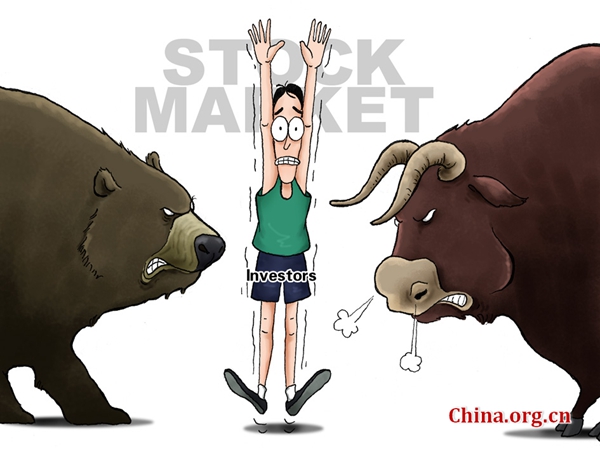China not the cause of global economic crisis
- By Heiko Khoo and Michael Roberts
 0 Comment(s)
0 Comment(s) Print
Print E-mail China.org.cn, January 22, 2016
E-mail China.org.cn, January 22, 2016
|
|
|
I surrender… [By Zhai Haijun/China.org.cn] |
The world's stock markets are spiralling downwards. The U.S. equity market fell 10 percent last month. Investor terminology calls this a "correction" not a crash. But prospects don't look good.
Big investors, banks and financial institutions are worried that China's economy is imploding and they expect a significant devaluation of the yuan. This would hurt other emerging economies and drag the rest of world, including the advanced capitalist economies into a global slump.
The economists at many investment banks, previously confident of economic recovery and lauding the great emerging market "miracle," are now in despair. For example, analysts at the Royal Bank of Scotland (RBS) just told clients to "sell everything" as stock markets could fall more than a fifth, while oil and other commodity prices could drop to a tenth of where they were just a year ago. RBS noticed a "nasty cocktail" of commodity price deflation, recession in emerging economies, capital flight by China's rich and by investors from other emerging economies, and the prospect of higher dollar debt servicing costs as the U.S. Federal Reserve raises interest rates this year.
Capitalism is an unplanned economic system that automatically experiences booms and slumps. The outlook of its sales staff is predisposed to wild mood swings - like those of a manic-depressive. They commonly alternate between exaggerated optimism and deep pessimism.
The doom-mongers concentrate on China. RBS analysts say that "China has set off a major correction and it is going to snowball… the epicentre of global stress is China, where debt-driven expansion has reached saturation. The country now faces a surge in capital flight and needs a 'dramatically lower' currency." Albert Edwards at Societe Generale, who predicted a deflationary slump during the last five years of global economic recovery, now says the Chinese crisis will lead to a global slump. "The western manufacturing sector will choke under this imported deflationary tourniquet."
Is China really to blame? There is no question that the Chinese economy faces numerous problems. Growth has slowed to under 7 percent on official estimates in 2015. When the Great Recession broke in 2008, the Chinese government reacted to falling export demand by launching a huge government-spending program focused on infrastructure. This succeeded. Interest rates were slashed and local authorities were allowed to borrow to spend on housing and other projects. However, Chinese non-financial debt rose from about 100 percent to about 250 percent of GDP. Total social financing, a broad measure of monthly credit creation, is now growing at nearly three times the rate of officially recorded money GDP growth.
There are some who argue that China must open up to more foreign and private capital. They say that China should privatize the big state owned companies and banks, end capital controls, and allow the Chinese yuan to become a freely fluctuating currency. Indeed, just before the Chinese stock market and currency fall began, the Chinese yuan was included in the IMF's international reserve currency basket. Therefore, the yuan is increasingly subject to the laws of the international currency markets and the capitalist law of value.






